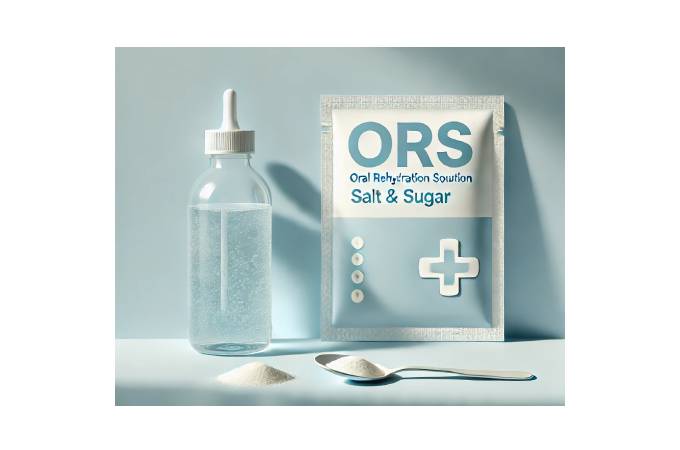Origin and History
Understanding ORS (Oral Rehydration Solution) is important as it is a lifesaving mixture of water, salts, and sugars designed to prevent and treat dehydration, especially due to diarrhea. The concept of ORS emerged in response to the global health crisis caused by cholera outbreaks, particularly in regions with poor sanitation.
The concept of ORS originated in the early 1960s as a response to the global health crisis of cholera outbreaks, especially in regions with poor sanitation. Researchers at the University of Dhaka in Bangladesh discovered that dehydration caused by cholera could be effectively treated with a simple rehydration solution.
Dr. Dilip Mahalanabis, an Indian pediatrician, is credited with the invention of ORS. During the cholera epidemic in 1968, he conducted pioneering research demonstrating that a simple oral rehydration solution could effectively treat severe dehydration. His work was instrumental in proving that dehydration from diarrhea could be managed without intravenous fluids, which are often costly and logistically challenging to administer in resource-limited settings.
In 1975, Dr. Mahalanabis published his findings in a landmark paper, leading to widespread acceptance of ORS as a standard treatment for dehydration worldwide. His contributions significantly impacted global health policies, particularly in developing countries, making ORS an essential tool in managing diarrheal diseases.
By 1978, the World Health Organization (WHO) recognized the effectiveness of ORS in treating diarrhea, leading to its adoption as a standard treatment for dehydration worldwide. This innovation changed the landscape of healthcare, providing an affordable and accessible solution to combat dehydration resulting from various illnesses, especially diarrhea.
About the Product
ORS is a balanced mixture of electrolytes, including sodium and potassium, along with glucose. The glucose not only helps in rehydration but also facilitates the absorption of sodium in the intestine, enhancing the overall effectiveness of the solution. ORS can be prepared using pre-packaged sachets that are easily available at pharmacies or by mixing specific measurements of sugar and salt in clean water at home.
The World Health Organization recommends the following composition for an effective ORS solution:
- Sodium Chloride: 2.6 grams
- Glucose: 13.5 grams
- Potassium Chloride: 1.5 grams
- Trisodium citrate dihydrate: 2.9 grams
- Water: 1 liter
This formulation is specifically designed to restore hydration levels quickly and efficiently, making it ideal for treating dehydration caused by Diarrhea, vomiting, and excessive sweating.
Usage
ORS is primarily used to prevent and treat dehydration, especially in cases of diarrhea. It is a crucial tool in managing acute gastroenteritis in both children and adults. The solution works effectively in replenishing lost fluids and electrolytes, thereby reducing the risk of serious complications, such as kidney failure or shock.
To use ORS effectively, it is important to follow these guidelines:
- Preparation: Always prepare the ORS according to the manufacturer’s instructions or the WHO guidelines to ensure proper concentration. Using too much or too little salt or sugar can diminish its effectiveness.
- Dosage: For children, it is recommended to start with small sips every few minutes, gradually increasing the amount as tolerated. For adults, drinking a cup of ORS after every episode of diarrhea is generally effective.
- Continued Feeding: While ORS is crucial for rehydration, it should not replace normal feeding, especially for children. They should continue to consume their usual diet alongside ORS to ensure adequate nutrition.
- Monitoring: Keep an eye on symptoms. If dehydration persists or worsens, seek medical attention immediately.
- Limitations: ORS is effective for mild to moderate dehydration, but severe cases may require intravenous fluids and immediate medical intervention.
Disclaimer
While ORS is a lifesaving solution for dehydration, it is essential to consult a healthcare professional if symptoms persist or worsen. ORS should not be used as a substitute for medical treatment in severe cases of dehydration or in individuals with underlying health conditions that may complicate recovery. Additionally, individuals should not rely solely on ORS if they have conditions that affect their electrolyte balance, such as kidney disease or heart problems.
In conclusion, Oral Rehydration Solution (ORS) represents a significant advancement in public health, providing a simple and effective means of rehydration. Its origin dates back to crucial health challenges, and it has proven its effectiveness in various situations. By understanding the proper usage and preparation of ORS, individuals can protect themselves and their families from the dangers of dehydration, particularly during outbreaks of diarrheal diseases.
Ultimately, the widespread availability and low cost of ORS make it a vital resource for global health, especially in regions where access to advanced medical care is limited.

